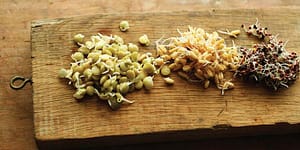Should you skip breakfast?

When it comes to whether or not you should skip breakfast, there is a lot of conflicting information out there. Some research claims that skipping breakfast is the key to loosing weight. Others, on the other hand, have proven that skipping breakfast could cause your metabolism to slow down and make you gain weight.
So, what’s the truth? Should you skip breakfast?
The following is an excerpt from Peak 40 by Marc Bubbs. It has been adapted for the web.
Today, more and more people are skipping breakfast – as many as 25 percent according to the latest polls.1 Time restricted eating (TRE) is the term used to describe shrinking the ‘window’ in which you eat. For example, you might delay your breakfast or first meal until 11am or noon and stop eating at 6 or 7pm. You might have heard this type of dietary pattern being referred to as Intermittent Fasting, but this isn’t quite right. Intermittent fasting (IF) is when you fast for two days per week, eating less than 500–800 calories on those days, and eating normally the remaining days of the week. Nevertheless, between TRE and IF, and many different variations in between, fasting is a popular option today.
But, does it help with weight loss? How about fighting off chronic conditions? In the complex and ‘wicked’ world of nutritional science, there are few clear-cut answers. But the research world has been abuzz with studies examining the benefits, and pitfalls, of eating (versus skipping) breakfast on weight loss and health. What should you do to reach PEAK40 health and performance? Let’s dive into the research.
The Breakfast Research Timeline

Over the next few years, the surge in popularity for TRE led the prestigious British Medical Journal to publish a review of 13 studies examining the effects of breakfast on weight loss.3 Researchers wanted to put to the test the commonly held beliefs that skipping breakfast leads to more snacking later in the day and that eating breakfast helps to improve satiety for the rest of your day. What did they uncover? Scientists couldn’t find consistent evidence that eating breakfast or skipping breakfast was superior for weight loss. Some people did lose weight, others did not. Some people improved their glucose and insulin levels (as well as appetite-controlling hormones like ghrelin or leptin), while others did not. However, researchers did find that people who eat breakfast tend to follow an array of healthy lifestyle choices: they exercise more regularly, they go to bed earlier, they consume more fibre and they’re less likely to smoke or binge drink.4 New science is starting to unpack with more precision the potential pitfalls of skipping breakfast and how eating the ‘right’ breakfast can lay the foundation for health and weight loss.
What Happens When You Skip Breakfast?
Let’s circle back and look at the common traits of people who regularly skip breakfast. People who don’t eat breakfast typically have higher HbA1c levels (a three-month average blood sugar control), higher diastolic blood pressure, higher triglycerides, higher uric acid levels (a marker of inflammation) and lower HDL-c levels.5 Breakfast skippers are more likely to have a higher body weight, a greater risk of developing Type 2 diabetes and an increased prevalence of atherosclerosis.6
This connection between breakfast skipping and increased risk of atherosclerosis has been found to be independent of conventional heart disease risk factors in middle-aged adults (who do not suffer from any cardiovascular disease symptoms).7 Breakfast skippers also have a higher risk of heart attack and stroke, regardless if they have a history of poor heart health.8 People who skip breakfast often struggle with lifestyle behaviours as well. Breakfast skippers tend to stay up later and have poorer sleep quality. For example, sleep-deprived middle-aged adults show higher stress hormone levels, leading to greater arterial stiffness.9 They also have a tendency towards lower mood and depressive symptoms.
If you’re struggling with high blood glucose levels, it’s important to note that skipping breakfast can amplify your glucose response to meals during the rest of the day and impair insulin secretion.10 But it’s important to remember, correlation isn’t causation. Skipping breakfast isn’t causing these outcomes.
If You’re Lean and Active …
New research on the impacts of eating breakfast for weight loss and health are uncovering some fascinating new insights. A few years ago, Dr Javier Gonzalez, PhD, and his team at Bath University in England compared how lean (defined as a BMI between 18.5–24.9kg/m2) versus obese individuals responded to cutting out breakfast for an extended period of time. They recruited 49 individuals and, over a six-week period, instructed the breakfast group to consume at least 700 calories by 11am and a minimum of 50 per cent of those calories within two hours of getting up in the morning.11 Participants could select various food options, however, most opted for the typical breakfast of cereal, toast and juice. Gonzalez assessed markers of body composition and cardiovascular and metabolic health before and after the intervention, as well as the activity of over 40 different genes and proteins. All this in an attempt to pinpoint scientifically what key physiological processes may be at play when eating, or skipping, breakfast.

Breakfast Helps Glucose Control If You’re Overweight
How did the obese participants fair? Eating breakfast also resulted in a drop in fat-burning genes but, surprisingly, it decreased the activity of genes involved in insulin resistance. This was a novel twist. Eating breakfast in the obese group improved their ability to take up carbohydrates, a finding in step with previous research that showed breakfast consumption is associated with better glucose control in fat cells. This is a really important finding for obese and overweight individuals looking to improve glucose control and lose weight: eating breakfast helped (in a big way!). Another surprising finding in the obese group was that skipping breakfast increased the genes associated with inflammation, something not seen in the lean group. This has the potential to be problematic in the long-term for obese and overweight individuals, as chronic inflammation worsens glucose control. Skipping breakfast also worsens your blood glucose response to lunch – if you eat breakfast, your glucose tolerance at lunchtime improves, a phenomenon known as the ‘second meal effect’.
In Summary
If you’re obese or overweight, breakfast appears to be an important strategy for protecting against Type 2 diabetes and the subsequent adverse health effects of chronically high blood sugar levels. Of course, you need to pick the right breakfast. (More on this at the end of the chapter.)
If you’re active and have a healthy body weight, you can choose from both options: skipping breakfast on specific days to support metabolic health (your body’s ability to effectively burn body fat for fuel) and eating breakfast on the other days to support intense exercise and to avoid the pitfalls fasting can have on your daily energy expenditure and muscle mass.
This highlights the importance of individualized recommendations – context matters.
Notes
- Charles Spence, ‘Breakfast: The Most Important Meal of the Day?,’ International Journal of Gastronomy and Food Science 8 (July 2017): 1–6, https://doi.org/10.1016 /j.ijgfs.2017.01.003.
- Emily J. Dhurandhar et al., ‘The Effectiveness of Breakfast Recommendations on Weight Loss: A Randomized Controlled Trial,’ The American Journal of Clinical Nutrition 100, no.2 (August 2014): 507–13, https://doi.org/10.3945/ajcn.114.089573.
- Katherine Sievert et al., ‘Effect of Breakfast on Weight and Energy Intake: Systematic Review and Meta-analysis of Randomised Controlled Trials,” BMJ 364, no. 142 (January 2019), https://doi.org/10.1136/bmj.l42.
- Tomoya Mita et al., ‘Breakfast Skipping Is Associated with Persistently Increased Arterial Stiffness in Patients with Type 2 Diabetes,’ BMJ Open Diabetes Research and Care 8, no. 1 (February 2020), https://doi.org/10.1136/bmjdrc-2019-001162.
- Amber A.W.A. van der Heijden et al., ‘A Prospective Study of Breakfast Consumption and Weight Gain among U.S. Men,’ Obesity 15, no. 10 (September 2012), https://doi.org/10.1038/oby.2007.292.
- Rania A. Mekary et al., ‘Eating Patterns and Type 2 Diabetes Risk in Men: Breakfast Omission, Eating Frequency, and Snacking,’ The American Journal of Clinical Nutrition 95, no. 5 (May 2012): 1182–9, https://doi.org/10.3945/ajcn.111.028209; Irina Uzhova et al., ‘The Importance of Breakfast in Atherosclerosis Disease: Insights from the PESA Study,’ Journal of the American College of Cardiology 70, no. 15 (October 2017): 1833–42, https://doi.org/10.1016/j.jacc.2017.08.027.
- Leah Cahill et al., ‘Prospective Study of Breakfast Eating and Incident Coronary Heart Disease in a Cohort of Male US Health Professionals,’ Circulation 128, no. 4 (July 2013): 337–343, https://doi.org/10.1161/CIRCULATIONAHA.113 .001474; Kenneth Anujuo et al., ‘Relationship between Sleep Duration and Artierla Stifness in Multi-ethnic Population: The HELIUS Study,’ Chronbiol International Journal of Public Health 33, no. 5 (April 2016): 543–552, https://doi .org/10.3109/07420528.2016.1158721.
- ,‘ProspectiveStudyofBreakfastEatingandIncidentCoronaryHeart Disease in a Cohort of Male US Health Professionals,’ Circulation 128, no. 4 (July 2013): 337–43, https://doi.org/10.1161/CIRCULATIONAHA.113.001474; Yasuhiko Kubota et al., ‘Association of Breakfast Intake with Incident Stroke and Coronary Heart Disease: The Japan Public Health Center-Based Study,’ Stroke 47, no. 2 (January 2016): 477–81, https://doi.org/10.1161/STROKEAHA.115.011350; Shuang Rong et al., ‘Association of Skipping Breakfast with Cardiovascular and All-Cause Mortality,’ Journal of the American College Cardiology 73, no. 16 (April 2019): 2025–32, https://doi.org/10.1016/j.jacc.2019.01.065.
- Jihui Zhang et al., ‘Relationship of Sleep Quantity and Quality with 24-Hour Urinary Catecholamines and Salivary Awakening Cortisol in Healthy Middle-Aged Adults,’ Sleep 34, no. 2 (February 2011): 225–33, https://doi.org/10.1093/sleep/34.2.225.
- Daniela Jakubowicz et al., ‘Fasting until Noon Triggers Increased Postprandial Hyperglycemia and Impaired Insulin Response after Lunch and Dinner in Individuals with Type 2 Diabetes: A Randomized Clinical Trial,’ Diabetes Care 38, no. 10 (October 2015), https://doi.org/10.2337/dc15-0761.
- Javier T. Gonzalez et al., ‘Molecular Adaptations of Adipose Tissue to 6 Weeks of Morning Fasting vs. Daily Breakfast Consumption in Lean and Obese Adults,’ The Journal of Physiology 596, no. 4 (November 2017), https://doi.org/10.1113/JP275113.
Recommended Reads
Recent Articles
Want to start your own medicinal herb garden? Passionflower, lemon balm, and goldenseal are great places to begin! These herbs are jam-packed with medicinal properties and easy to grow in a majority of climates.
Read MoreSprouts are easy to cultivate, mature quickly and pack a nutritional punch! You can make nutrient-rich sprouts from all kinds of edible seeds in your kitchen.
Read MoreSuffering from frequent headaches is miserable and immobilizing. If you haven’t had luck treating and preventing your headaches, skip the over-the-counter approach and prepare herbal formuals for migraines to use in the future! The following is an excerpt from Herbal Formularies for Health Professionals, Volume 4 by Jill Stansbury. It has been adapted for the…
Read More“It is more important to know what kind of person has a disease than to know what kind of disease a person has.” —Hippocrates Drawing on her decades of clinical experience and her extensive research, Dr. Jill Stansbury offers an unparalleled range of herbal formulas in her five-volume set, Herbal Formularies for Health Professionals. For each…
Read More








